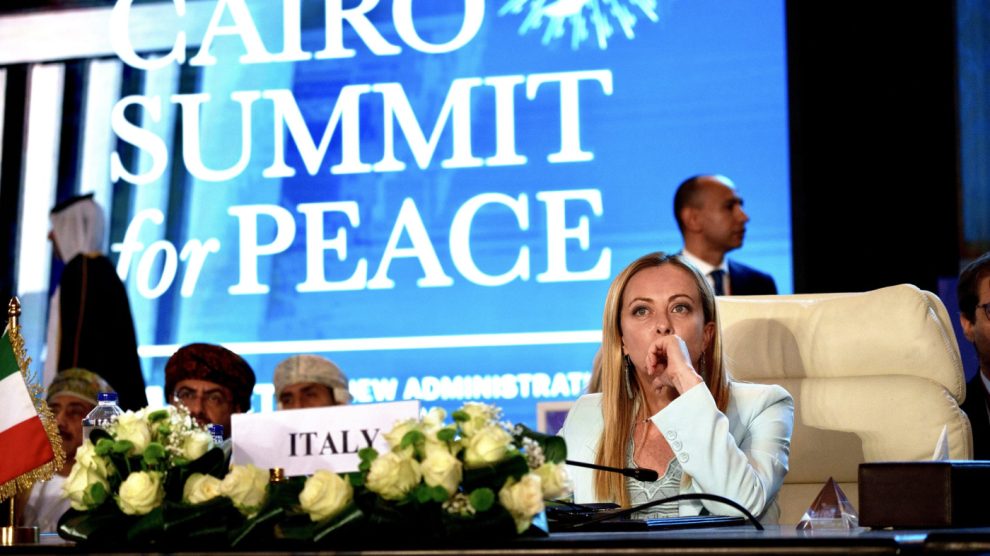Quint+ leaders discuss Israel. On Sunday, the heads of State and governments of the Quint (France, Germany, Italy, the United Kingdom, and the United States) plus Canada discussed developments in the ongoing Israel-Hamas conflict. In the follow-up statement, they “reiterated their support for Israel and its right to defend itself against terrorism” and “called for adherence to international humanitarian law, including the protection of civilians.”
- They also welcomed the release of two US hostages and called for the immediate release of all the others while pledging to closely coordinate to support their citizens in the region, especially those eager to leave Gaza.
Temperature rising. Regional tensions show no signs of abating, as Israeli forces continue exchanging fire with Hamas in the Gaza Strip (which they are readying to invade) and Hezbollah on the Lebanese border to the north. Saturday’s Cairo Peace Summit – where Italian Prime Minister Giorgia Meloni was the only Quint+ leader in attendance – ended without a joint statement, and the Arab countries’ anger for Israel’s response was on full display.
- PM Meloni travelled to Tel Aviv right after Saturday’s summit. There, she met with her counterpart Benjamin Netanyahu, spoke over the phone with President Isaac Herzog, and expressed Italy’s support. “We had to fight yesterday and today strongly defend Israel’s right to exist and defend the security of its people. And we believe […] that you can do that in the best way because we are different from those terrorists,” she told him.
The West’s response. Western countries had followed the same line during Saturday’s summit, opting for a more moderate tone (stressing Israel’s right to self-defence and the terrorist nature of Hamas) and more easily attainable goals. These included humanitarian relief for civilians, which started flowing into Gaza on Saturday after Egypt partly opened the Rafah crossing to allow a handful of aid trucks.
- In their call on Sunday, Quint+ leaders “welcomed the announcement of the first humanitarian convoys reaching Palestinians in need of relief in Gaza and expressed their commitment to continue coordinating with partners in the region to ensure sustained and safe access to food, water, medical care and other assistance needed to meet humanitarian needs.”
Red-hot phone lines. The Western leaders also pledged to continue close diplomatic coordination, “including with key partners in the region, to prevent the spread of conflict, preserve stability in the Middle East and work toward a political solution and lasting peace.” Rome has been at the forefront of this effort through an all-of-government engagement with regional actors.
- The Quint+ is moving in parallel. German Chancellor Olaf Scholz, US President Joe Biden and UK PM Rishi Sunak have already travelled to Israel, while French President Emmanuel Macron is expected to visit on Tuesday.
The way forward. In the opening session of Saturday’s summit, the Italian PM had called on the international community to help avoid an escalation that would generate “global repercussions” and resume working on a “two people, two states” solution to the Israel-Palestine issue. Even if the participants’ positions do not match perfectly, she stressed, all share the interest that “what is happening in Gaza does not turn into a broader conflict, a religious war, a clash of civilisations, undoing the [normalisation] efforts made courageously in recent years.”
- She voiced her suspicion that Hamas aims to force Israel’s hand into a reaction against Gaza “that would create an unbridgeable furrow between Arab countries, Israel and the West” and “compromise peace for all the people involved,” Palestinians included. “The target is all of us, and to fall into this trap would be very, very stupid.”
- That’s why “dialogue and reasoning” are the way forward, she stressed. “Terrorist actions have weakened the legitimate demands of peoples, especially in the Muslim world. Into this dynamic comes the choice of Hamas, which uses terrorism to prevent any dialogue.”




